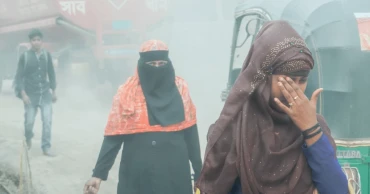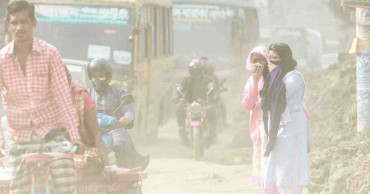Dhaka air pollution
Dhaka tops global pollution chart with ‘very unhealthy’ AQI of 240
Dhaka, the densely populated capital of Bangladesh, ranked first among the world’s most polluted cities on Tuesday morning, recording an Air Quality Index (AQI) of 240 at 9:19 am.
Today, the city’s air was classified as ‘very unhealthy’, indicating a serious health threat, according to the AQI report.
Lahore in Pakistan, Delhi in India, and Kolkata in India occupied the second, third, and fourth spots on the list, with AQI scores of 237, 200, and 194 respectively.
According to the AQI scale, a reading between 50 and 100 is considered ‘moderate’, with generally acceptable air quality, though sensitive individuals should limit prolonged outdoor exertion. AQI levels of 101–150 are ‘unhealthy for sensitive groups’, 151–200 is ‘unhealthy’, 201–300 is ‘very unhealthy’, and readings above 301 are considered ‘hazardous’, posing severe health risks.
The AQI, which reports daily air quality, informs residents how clean or polluted the air is and highlights potential health effects. In Bangladesh, the AQI is calculated based on five key pollutants: particulate matter (PM10 and PM2.5), nitrogen dioxide (NO2), carbon monoxide (CO), sulfur dioxide (SO2), and ozone.
Air in Dhaka ‘unhealthy’, global pollution ranking fifth
Dhaka has long struggled with air pollution. Air quality usually deteriorates in winter and improves during the monsoon season.
The World Health Organization (WHO) estimates that air pollution causes about seven million deaths worldwide each year, primarily from stroke, heart disease, chronic obstructive pulmonary disease, lung cancer, and acute respiratory infections.
1 day ago
Air in Dhaka ‘unhealthy’, global pollution ranking fifth
Dhaka, the densely populated capital of Bangladesh, ranked fifth among the world’s most polluted cities on tuesday morning, recording an Air Quality Index (AQI) of 178 at 9:28 am.
Today, the city’s air was classified as ‘unhealthy’, indicating a serious health threat, according to the AQI report.
Lahore in Pakistan, Delhi in India, Tashkent in Uzbekistan, and Dakar in Senegal occupied the first, second, third and fourth spots on the list, with AQI scores of 281, 193, 185 and 178 respectively.
According to the AQI scale, a reading between 50 and 100 is considered ‘moderate’, with generally acceptable air quality, though sensitive individuals should limit prolonged outdoor exertion. AQI levels of 101–150 are ‘unhealthy for sensitive groups’, 151–200 is ‘unhealthy’, 201–300 is ‘very unhealthy’, and readings above 301 are considered ‘hazardous’, posing severe health risks.
The AQI, which reports daily air quality, informs residents how clean or polluted the air is and highlights potential health effects. In Bangladesh, the AQI is calculated based on five key pollutants: particulate matter (PM10 and PM2.5), nitrogen dioxide (NO2), carbon monoxide (CO), sulfur dioxide (SO2), and ozone.
Dhaka’s air quality 3rd worst in the world this morning
Dhaka has long struggled with air pollution. Air quality usually deteriorates in winter and improves during the monsoon season.
The World Health Organization (WHO) estimates that air pollution causes about seven million deaths worldwide each year, primarily from stroke, heart disease, chronic obstructive pulmonary disease, lung cancer, and acute respiratory infections.
2 days ago
Dhaka's air quality turns ‘very unhealthy’
Dhaka, the densely populated capital of Bangladesh, ranked fourth among the world’s most polluted cities on tuesday morning, recording an Air Quality Index (AQI) of 213 at 9:26 am.
Today, the city’s air was classified as ‘very unhealthy’, indicating a serious health threat, according to the AQI report.
Delhi in India, Lahore in Pakistan, and Yangon in Myanmar occupied the first, second, and third spots on the list, with AQI scores of 244, 243, and 221 respectively.
According to the AQI scale, a reading between 50 and 100 is considered ‘moderate’, with generally acceptable air quality, though sensitive individuals should limit prolonged outdoor exertion. AQI levels of 101–150 are ‘unhealthy for sensitive groups’, 151–200 is ‘unhealthy’, 201–300 is ‘very unhealthy’, and readings above 301 are considered ‘hazardous’, posing severe health risks.
The AQI, which reports daily air quality, informs residents how clean or polluted the air is and highlights potential health effects. In Bangladesh, the AQI is calculated based on five key pollutants: particulate matter (PM10 and PM2.5), nitrogen dioxide (NO2), carbon monoxide (CO), sulfur dioxide (SO2), and ozone.
Dhaka has long struggled with air pollution. Air quality usually deteriorates in winter and improves during the monsoon season.
Dhaka tops world’s most polluted cities with ‘hazardous’ air
The World Health Organization (WHO) estimates that air pollution causes about seven million deaths worldwide each year, primarily from stroke, heart disease, chronic obstructive pulmonary disease, lung cancer, and acute respiratory infections.
8 days ago
Dhaka air world’s most polluted this morning
Dhaka topped the list of cities around the world with the worst air quality this morning (March 19, 2023).
With an air quality index (AQI) score of 196 at 9:20 am today, Dhaka ranked first among cities with the most polluted air. The air was classified as ‘unhealthy’.
South Korea’s Incheon and Myanmar’s Yangon occupied the second and third spots on the list, with AQI scores of 175 and 173.
An AQI between 151 and 200 is considered ‘unhealthy’ while 201–300 is ‘‘very unhealthy’, and 301–400 is 'hazardous', posing severe health risks to residents.
Read more: River pollution: Artists take to unique protest in Habiganj
The AQI, an index for reporting daily air quality, informs people how clean or polluted the air of a certain city is and what associated health effects might be a concern for them.
The AQI in Bangladesh is based on five pollutants: particulate matter (PM10 and PM2.5), NO2, CO, SO2, and ozone.
Dhaka has long been grappling with air pollution issues. Its air quality usually turns unhealthy in winter and improves during the monsoon.
As per World Health Organization (WHO), air pollution kills an estimated seven million people worldwide every year, mainly due to increased mortality from stroke, heart disease, chronic obstructive pulmonary disease, lung cancer, and acute respiratory infections.
Read More: Govt committed to doing all it can to defeat pollution: Environment Minister
2 years ago
Dhaka dominates list of polluted world cities
The densely populated capital of Bangladesh continues to dominate the list of cities with the worst air quality in the world.
On Wednesday, Dhaka was ranked the world's second-most polluted city, as its air quality index (AQI) was recorded at 159 at 9.10am.
India’s Delhi and Saudi Arabia's Riyadh occupied the first and the third spots, with AQI scores of 218 and 149, respectively, in the list.
An AQI between 151and 200 is considered 'unhealthy' for everyone and members of sensitive groups may experience more serious health effects.
Read: Dhaka's air quality deteriorates again
Similarly, an AQI between 201 and 300 is said to be 'poor', while a reading of 301 to 400 is considered 'hazardous', posing serious health risks to residents.
AQI, an index for reporting daily air quality, is used by government agencies to inform people how clean or polluted the air of a certain city is, and what associated health effects might be a concern for them.
In Bangladesh, the AQI is based on five criteria pollutants -- Particulate Matter (PM10 and PM2.5), NO2, CO, SO2 and Ozone.
Dhaka has long been grappling with air pollution issues. Its air quality usually turns unhealthy in winter and improves during the monsoon.
A report by the Department of Environment (DoE) and the World Bank in March 2019 pointed out that the three main sources of air pollution in Dhaka "are brick kilns, fumes from vehicles and dust from construction sites".
Read: Global Covid cases near 533 million
With the advent of winter, the city’s air quality starts deteriorating sharply due to the massive discharge of pollutant particles from construction work, rundown roads, brick kilns and other sources.
Air pollution consistently ranks among the top risk factors for death and disability worldwide. Breathing polluted air has long been recognised as increasing a person’s chances of developing a heart disease, chronic respiratory diseases, lung infections and cancer, according to several studies.
As per the World Health Organization (WHO), air pollution kills an estimated seven million people worldwide every year, largely as a result of increased mortality from stroke, heart disease, chronic obstructive pulmonary disease, lung cancer and acute respiratory infections.
3 years ago
Solution to pollution: Sprinkling water on Dhaka's roads & construction sites?
Summer or winter, air pollution trends across the seasons in Dhaka. And this year-round air pollution is largely attributed to the same emissions -- construction and road dust.
Construction dust is basically silica dust prevalent at construction sites and is often held responsible for health conditions like asthma. Leftover construction waste also adds dust to air.
Road dust, on the other hand, is loose soil on broken or unpaved roads, and includes vehicular emissions to an extent.
Experts, however, claim to have a quick fix solution for Dhaka's air pollution that peaks during winter and prevails in summer too -- sprinkling water on all construction sites, public or private, and roads to settle dust.
MA Matin, former general secretary of Bangladesh Poribesh Andolon (BAPA), told UNB that air pollution is increasing day by day in Dhaka due to the absence of an effective control mechanism.
“Dust and sand particles cause air pollution but the city's two civic bodies have to take concrete steps to control the same. The pollution has hazardous health implications that can cause death directly or indirectly."
Professor Dr Najmul Islam, director of the Disease Control Department of the Health Directorate, echoed similar voice.
Read: Dhaka’s air still ‘very unhealthy’
“Pollutants are getting mixed with foods and triggering serious health issues -- from asthma to lung disease and kidney failure. It's high time that the pollution was curbed," he said.
Bangladesh Environment, Forest and Climate Change Minister Md Shahab Uddin urged all agencies concerned to act in a coordinated manner to control pollution.
“Time and again, we have set up several camps in Dhaka and other big cities to determine the air quality level. However, it did not work and we now need coordinated steps to curb pollution,” he said.
According to the Minister, it’s the responsibility of the two city corporations to keep its roads clean every day. “They must also sprinkle water on the roads to bring down the dust,” he said.
"Several decisions were taken at the inter-ministerial meetings to curb air pollution. Implementation of the measures can give effective results but there is no alternative to coordinated efforts of all agencies."
Read: Winter rain lashes Dhaka, more likely on Thursday in parts of Bangladesh
3 years ago
Dhaka’s air quality still ‘unhealthy’ despite rain
Dhaka ranked third worst world cities in the Air Quality Index on Monday morning even though a strong nor’wester, coupled with rains, lashed different parts of the country, including the capital, on Sunday.
Dhaka occupied the 3rd position in the list of world cities with the worst air quality. The city’s Air Quality Index (AQI) was recorded 183 around 09.31 am.
Also Read: Dhaka's air quality still 'unhealthy'
Nepal’s Kathmandu and Myanmar’s Yangon occupied the first and second slots with AQI scores of 331 and 191 respectively.
An AQI between 101 and 200 is considered 'unhealthy', particularly for sensitive groups of people like children and elderly population.
AQI, an index for reporting daily air quality, is used by government agencies to inform people how clean or polluted the air of a certain city is, and what associated health effects might be a concern for them.
Meanwhile, a nor’wester, accompanied by rain and gusty wind, swept the capital and other parts of the country on Sunday.
Also Read: Dhaka's air 'unhealthy' again as it ranks 2nd in Air Quality
At least 12 people were killed in Gaibandha and Faridpur districts during the storm.
The tropical storm, the first of the season, also hit the capital around 6:30pm and lasted for a few minutes, according to the Met Office.
In Bangladesh, the AQI is based on five criteria pollutants - Particulate Matter (PM10 and PM2.5), NO2, CO, SO2 and Ozone.
Dhaka has long been grappling with air pollution. Its air quality usually improves during monsoon.
A report by the Department of Environment (DoE) and the World Bank in March 2019 pointed out that the three main sources of air pollution in Dhaka "are brick kilns, fumes from vehicles and dust from construction sites".
Air pollution consistently ranks among the top risk factors for death and disability worldwide. Breathing polluted air has long been recognised as increasing a person’s chances of developing heart disease, chronic respiratory diseases, lung infections and cancer, according to several studies.
As per the World Health Organization (WHO), air pollution kills an estimated seven million people worldwide every year, largely as a result of increased mortality from stroke, heart disease, chronic obstructive pulmonary disease, lung cancer and acute respiratory infections.
4 years ago
No respite from pollution as Dhaka’s air quality still ‘unhealthy’
Dhaka, one of the most polluted cities in the world, ranked second worst in the Air Quality Index Monday morning .
4 years ago
Dhaka no longer world's most polluted city, but air quality still 'poor'
Dhaka is no longer the world's most polluted city, but that's no good news for residents as it continues to dominate the list of world capitals with the worst air quality.
5 years ago
Dhaka’s air pollution: HC seeks quick action as it outlined
The High Court on Tuesday ordered the authorities concerned to take steps and submit a report within 30 days to implement its nine-point directive to bring down the air pollution level in Dhaka and its adjacent areas.
5 years ago
















